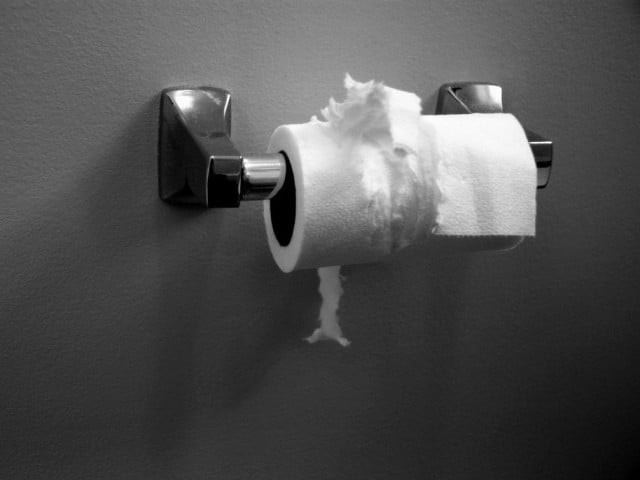Another World Toilet Day sans public toilets
Over 18,128 public schools deprived of facilities like working toilets, clean water in Sindh, says activist

Hammad Shah, a fourth-grade student, doesn’t remember his school ever having functional toilets. Located in the low-income local of Ibrahim Hyderi, the toilets at the Government Boys School, Rehri, have always been seen as a replacement for a storeroom, he told The Express Tribune a day before World Toilet Day, observed every year on November 19.
“Our school’s toilets remain strewn with broken furniture and most children have to go home when the nature calls,” he said.
According to other students at the school, as well as teachers, complaints regarding the issue have been made to relevant authorities multiple times, but to no avail.
The sorry state of the school, which cries out for a working toilet, reflects the situation elsewhere in Sindh. Most public schools in the province lack functional toilets, and so do the majority of public spots.
Consequently, the sight of people turning to a corner and relieving themselves in bushes, agricultural lands, playgrounds, footpaths and vacant plots is not rare.
No relief?
According to a report published by non-profit organisation Alif Ailaan in 2016, one in three public schools in Pakistan lack toilets, for multiple reasons.
To add to it, 40 per cent of Pakistan’s population - comprising more than 79 million people - does not have access to a decent toilet, according to WaterAid Pakistan country director Siddiq Khan.
Specifically talking about Sindh, activist Liaquat Ali told The Express Tribune that of over 42,000 public schools in Sindh, 18,128 are deprived of facilities like proper toilets and clean drinking water.
Plus, as per a report submitted to the Sindh High Court four years ago, there are no public toilets in at least seven districts of Sindh: Karachi’s West and South districts, Dadu, Kashmore-Kandhkot, Ghotki, Nawabshah and Mirpur Mathelo.
The report was prepared by Sindh Bar Council (SBC) members, who were tasked by the high court to verify the Sindh government’s claim that toilet facilities were provided at the district level across the province.
Medical experts, too, have voiced concern that in the absence of toilets and scant sanitation, numerous diseases are common among children, particularly diarrhoea.
“Around 19,500 children under five years of age die each year due to diarrhoea and related diseases,” said paediatrician Dr Zakir Hussain. Citing figures from a report by the United Nations Children’s Fund, he said, “More than two-third of households in Pakistan consume water contaminated with bacteria and [around] 53,000 Pakistani children die of diarrhoea every year after consuming this water.”
Moreover, the per capita Water and Sanitation (WASH) allocation in Pakistan from 2018 to 2019 was Rs491. A breakdown shows it was highest in Balochistan at Rs1,167, followed by Sindh at Rs876, then Punjab at Rs318, Khyber-Pakhtunkhwa (K-P) at Rs311 and at Rs244 in the federal capital.
According to budget books, the per capita WASH expenditure during the same period in the country was Rs291, standing at Rs776 in Balochistan, Rs396 in Sindh, Rs344 in K-P, Rs205 in the federal capital and Rs182 in Punjab.
World Toilet Day
As Pakistan struggles to improve sanitation - clearly evident in the afore-mentioned figures - others continue to observe World Toilet Day every year, looking to tackle global sanitation problems.
An international United Nations (UN) observance day, it is also aimed at sensitising governments and state institutions towards ensuring public access to toilets, the absence of which pollutes the environment.
Since water and sanitation improvements are part of the UN’s Sustainable Development Goals, Pakistan’s provincial governments have committed to launch schemes for the purpose.
Down the drain?
However, in Sindh at least, the schemes seem to be in doldrums.
Provincial and local government authorities in Sindh had earlier announced plans to set up 2,300 toilets at public places, including bus stops and parks. The plan is yet to materialise.
“It has been four years, but no serious efforts have been made to finalise the plan for establishing these public toilets,” claimed Rizwan Akhtar, a member of the SBC. “The unavailability of toilets at public places causes inconvenience for women and children in particular.”
Raising alarm over the disregard for the problem, Khan said, “Whilst the world has urgently risen to the challenge of Covid-19, every year hundreds of thousands of lives are lost because of the lack of clean water, decent toilets and hygiene. Having access to these is a basic human right so as to prevent infectious diseases.”
And, he stressed, toilets and sanitation systems were even more vital as the impact of climate change hit vulnerable communities.
Published in The Express Tribune, November 19th, 2020.



















COMMENTS
Comments are moderated and generally will be posted if they are on-topic and not abusive.
For more information, please see our Comments FAQ